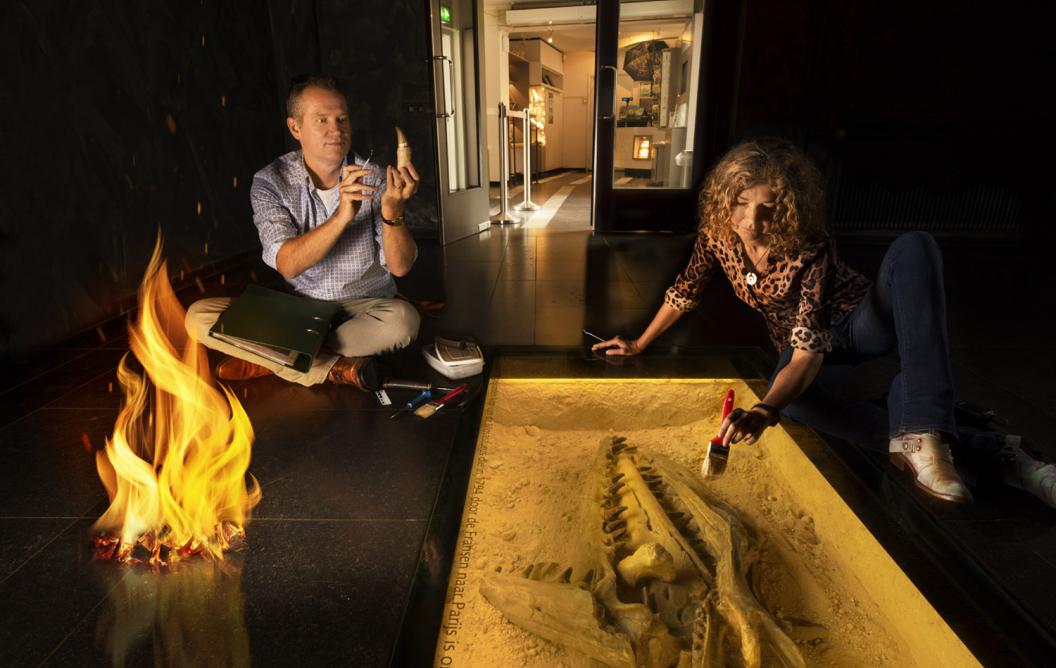Is time on our side?
“The palaeontology research group in Maastricht? Hasn’t that been around for centuries?” If José Joordens and Leon Claessens have anything to say about it, in a decade’s time a comment like this will not be out of place. Where could be better for a flourishing department focused on ancient traces, from dodos and dinosaurs to the origins of human life, than Maastricht, the place where Neanderthals lived and a Mosasaurus seems to be unearthed every second day? The professors staked out their ground at the recent Opening of the Academic Year, which focused on gravitational waves and the origins of the universe.
Until recently, palaeontology and evolutionary biology were not among the key disciplines at UM. This is set to change, say the newly appointed professors José Joordens and Leon Claessens. The latter relocated to Maastricht after 20 years of dodo and dinosaur research in the United States. His broad experience with liberal arts and sciences makes him an ideal new dean of the Maastricht Science Programme.
In return, he cannot say often enough that Maastricht is ideal for him too. “There’s actually no better breeding ground for this type of research and teaching. On the one hand because you’re literally standing on the site of the late Cretaceous period, known as the Maastrichtian age. People come from all over the world to conduct research on this period, when the dinosaurs died out, and to study the mosasaurus. The Natural History Museum is also a great source for teaching and research.” On the other hand, both professors appreciate the dynamic atmosphere of the country’s youngest university. Joordens: “It’s really unique, having that space to shape your research and teaching.”
A fascinating world
And so the two return to their Limburg roots, Joordens for one day a week and Claessens full time. They are eager to invite students into their fascinating world. “My most important research question is how did we become human?” Joordens says. “Why did homo erectus, who originated in Africa, become such a world traveller? What was the influence of the climate? But I also want to investigate sexual evolution with my students: why does a female choose a certain male? This is still an under-researched question.” Supported by a Vidi grant, she works in Indonesia on the same site on which another Limburger, Eugène Dubois, excavated the bones of prehistoric people around 1890. This drastically increased our understanding of human evolution.
Joordens followed in his footsteps, literally and figuratively, with a Nature publication in 2014 focusing on a shell that Dubois dug up on Java. After extensive research, she concluded that the inscription on the shell must have been made by homo erectus. This sensational finding did away with the prevailing idea that ‘we’ began to draw 75,000 years ago: another human species could already do so some half a million years ago. Claessens’s research triggered a similar paradigm shift. The dodo died out in the 17th century and only one complete skeleton remains. Focusing on this skeleton, Claessens led the international study that changed longstanding views about the dodo. Far from being slow, fat and stupid, the bird was clever and well-adapted.
The case of the dodo
Claessens is still conducting research in Mauritius, where the dodo lived before explorers laid anchor there. “I want to understand better how the dodo functioned. How was it able to grow so large? What caused it to die out so quickly after the Dutch settled the island?” In his view, the dodo is a case study that could tell us something about animal species threatened with extinction today. “It’s easy to think that palaeontology is only about old things, but actually it offers a view of the future.” He compares it to the study of political science: “Without knowledge of the past and the context, you’re blind if you try to extrapolate.”
Joordens recognises the sentiment. “We’re all still full of the traces of evolution, both physically and mentally. If we understand what happened in our past, we’re better able to deal with the future. This is why I’m also keen to collaborate with the Maastricht medical faculty. Many medical problems stem from the fact that we no longer exercise, eat and live as it was once intended.”
View to the future
Speaking of the future: how do palaeontologists view the current climate crisis? “Change is normal, as is extinction”, Claessens says. “Things are moving quickly at the moment, but I don’t lie awake at night thinking about it, because that’s not helpful. I prefer to do my research and gain new insights that way.” “The extinction of humanity is a very realistic prospect for me”, says Joordens cheerfully. Claessens: “Evolution is not like an iPhone, which is supposedly continually improving. Dumb luck also plays a big role.” Joordens: “Exactly! The dinosaur was a successful animal, but one day a comet comes rocketing out of the skies. That puts an end to the dinosaurs and makes way for other species. That’s Earth. It’s not obvious that we as a species are so great that we can solve every problem. Maybe. But you have to place yourself in the broader historical picture.”
